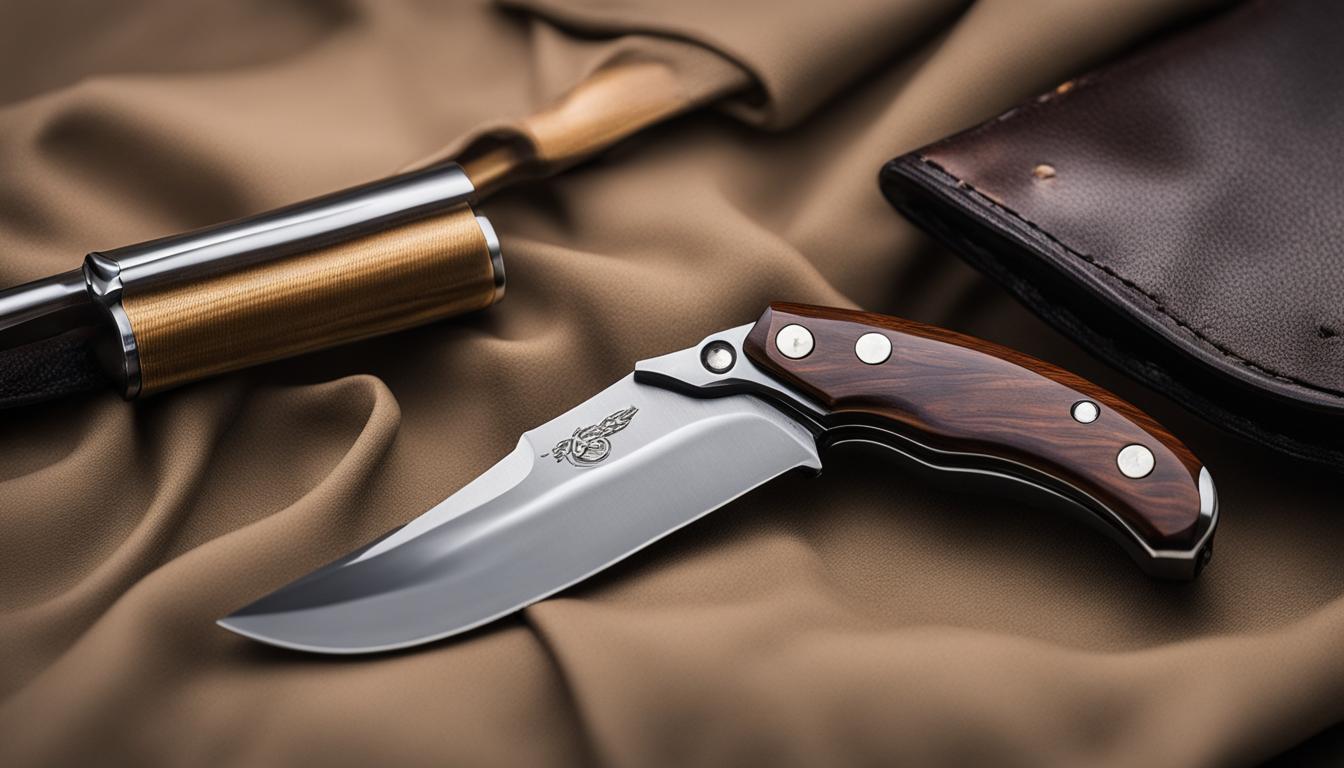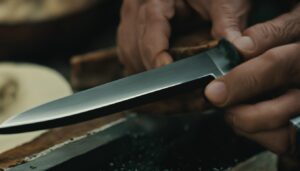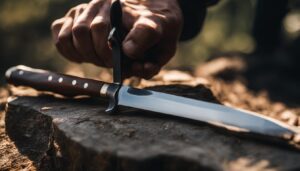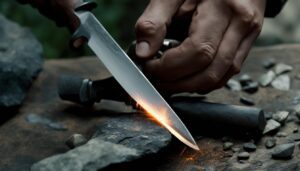Proper maintenance and cleaning are crucial to keep your folding hunting knives in top condition and ensure their optimal performance. Regular cleaning will help prevent rust, corrosion, and dirt buildup, extending the lifespan of your knives. Additionally, proper maintenance includes sharpening, disassembly, cleaning, lubrication, and reassembly.
To ensure you have everything you need for proper maintenance, create a gear checklist that includes pivot lube, corrosion inhibitor, Torx set, blue Loctite, isopropyl alcohol, microfiber cloth, paper towels, compressed air, cotton swabs, and a knife sharpening system.
When disassembling your knife, make sure to remove the screws carefully and organize them to avoid complications during reassembly. Cleaning the knife involves using isopropyl alcohol, cotton swabs, paper towels, and compressed air to remove any discoloration, patina, or rust. Lubrication should be done with suitable viscous products such as Benchmade Blue Lube, Tuf-Glide, or KPL. Finally, reassemble the knife carefully, using blue Loctite to ensure the blade stays centered and the action is consistent.
Sharpening or reprofiling the knife requires different sharpening systems and grits depending on the knife type and intended use. Proper maintenance and care of folding knives will not only prolong their lifespan but also keep them performing at their best every time.
Key Takeaways:
- Regular cleaning helps prevent rust, corrosion, and dirt buildup
- Proper maintenance includes sharpening, disassembly, cleaning, lubrication, and reassembly
- Create a gear checklist for proper maintenance
- Use suitable lubricants for proper knife functioning
- Sharpening depends on the knife type and intended use
Five Rules for Proper Knife Maintenance
Proper maintenance and care are crucial for keeping your folding knives in top condition and ensuring their longevity. By following these five rules, you can maintain your knives and keep them performing at their best:
- Keep your knife sharp: Regularly touch up the edge of your knife with a fine ceramic rod or fine-grit stone to avoid a dull blade. Different sharpening methods and angles should be chosen based on the type of knife and its intended use.
- Keep your knife clean: Wipe down the blade with a dry or slightly moistened cloth for everyday cleaning. For stubborn debris, gentle washing with dish soap can be done. Make sure to dry the knife thoroughly after cleaning.
- Keep your knife dry: It’s important to allow your knife to dry completely before storing it to prevent rust and moisture damage. This is especially crucial for knives stored in leather sheaths.
- Keep your knife well-oiled: Apply a small amount of oil to the pivot and moving parts of the knife to maintain smooth operation. Different lubricants can be used depending on personal preference and the intended use of the knife.
- Keep your knife in good working order: Regularly inspect and maintain your knife by checking screws, pivot tightness, and handle scales. If necessary, seek replacement parts to ensure optimal performance.
By following these five rules, you can ensure that your folding knives are well-maintained and ready for any task at hand.
Comparative Analysis of Sharpening Systems
| Sharpening System | Pros | Cons |
|---|---|---|
| Whetstones |
|
|
| Sharpening Rods |
|
|
| Guided Sharpening Systems |
|
|
“Keeping your knife sharp is not just about performance—it’s also about safety. A sharp knife requires less force to cut, reducing the risk of slipping and potential injuries.” – Knife Maintenance Expert
Proper knife maintenance is essential for the long-term performance and durability of your folding knives. By adhering to these rules and considering the comparative analysis of sharpening systems, you can ensure that your knives are always ready for use.
How to Maintain and Care for Different Types of Knives
Proper maintenance and care of different types of knives are essential to ensure their longevity and optimal performance. Whether you have hunting knives, pocket knives, kitchen knives, or outdoor and survival knives, each type requires specific maintenance techniques to keep them in good condition.
Hunting Knives
Hunting knives are exposed to various elements, including blood, dirt, and debris. It’s crucial to clean them thoroughly after each use to prevent damage and maintain their sharpness. Start by wiping off any visible dirt or residue with a dry cloth or paper towel. Then, use a mild dish soap and warm water to remove any stubborn stains or debris. Rinse the knife thoroughly and dry it completely before storing it.
Pocket Knives
For pocket knives used for everyday carry, regular maintenance is key. Check the lubrication regularly to ensure smooth operation. Wipe down the blade with a dry or slightly moistened cloth for everyday cleaning. For more stubborn debris, you can use a mild dish soap and water. Make sure to dry the knife thoroughly before folding and storing it.
Kitchen Knives
Kitchen knives should be cleaned and dried after each use to prevent rust and damage. Wash them by hand with mild dish soap and water, avoiding harsh abrasives or dishwasher use. Dry the knives immediately and store them in a knife block or on a magnetic strip to maintain their sharpness and prevent accidents.
Outdoor and Survival Knives
Outdoor and survival knives may require additional maintenance due to their exposure to harsh environments and heavy use. Regular sharpening and reprofiling are essential to keep the blades in optimal condition. Consider special treatments for the handle and blade, such as oiling or applying protective coatings, to prevent corrosion and extend the knife’s lifespan.
By following these maintenance tips and techniques specific to each type of knife, you can ensure that your knives stay in excellent condition and serve you well for a long time.
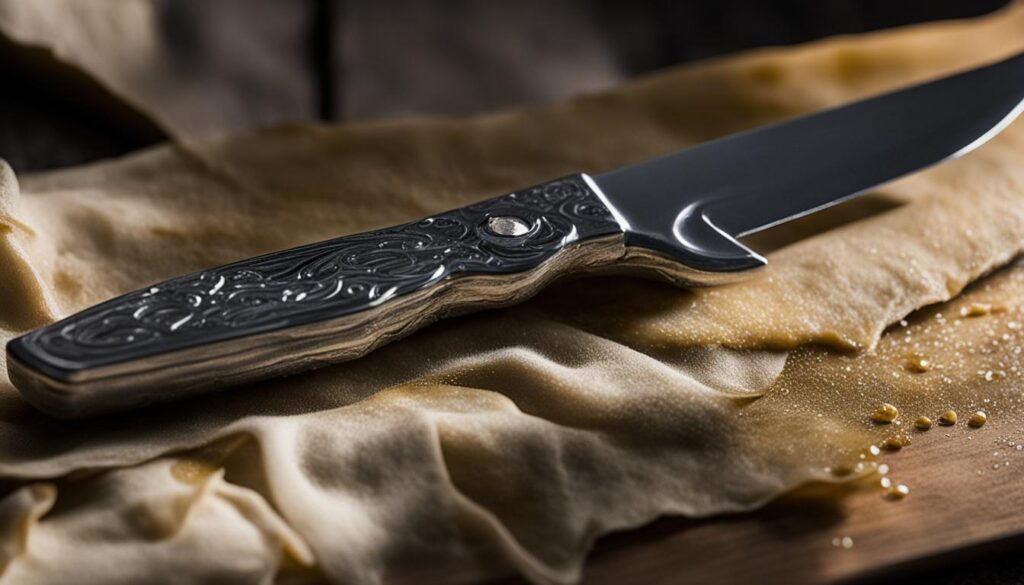
Additional Tips for Knife Maintenance and Care
Proper maintenance and care of knives are essential for their longevity and optimal performance. In addition to the five rules mentioned earlier, here are some additional tips to help you maintain and care for your knives:
1. Store your knives properly:
When not in use, it’s important to store your knives correctly to prevent damage. Consider using a knife block, magnetic strip, or sheath to protect the blade from accidental contact and prevent dulling. Avoid storing knives in damp or humid areas to prevent rust.
2. Avoid excessive force:
While knives are designed for cutting, excessive force can lead to damage or accidents. Avoid using your knife as a screwdriver, hammer, or pry bar, as this can cause the blade to chip or break. Instead, use the right tool for the job to ensure the longevity of your knife.
3. Regularly inspect and tighten screws:
Over time, the screws in your folding knives may loosen due to regular use. It’s important to inspect and tighten them periodically to maintain proper blade alignment and prevent wobbliness. Use a Torx set to tighten the screws and ensure a secure fit.
4. Keep your knife away from harsh chemicals:
Harsh chemicals, such as bleach or ammonia, can damage the blade and handle material of your knife. Avoid exposing your knife to these chemicals and clean it using mild soap or specialized knife cleaners.
5. Seek professional help when needed:
If you’re unsure about how to properly maintain or repair your knife, it’s always best to seek professional help. Many knife manufacturers offer maintenance and sharpening services, ensuring that your knife receives expert care.
By following these additional tips and the previously mentioned rules, you can ensure that your knives remain in top condition and provide reliable performance when you need them the most.
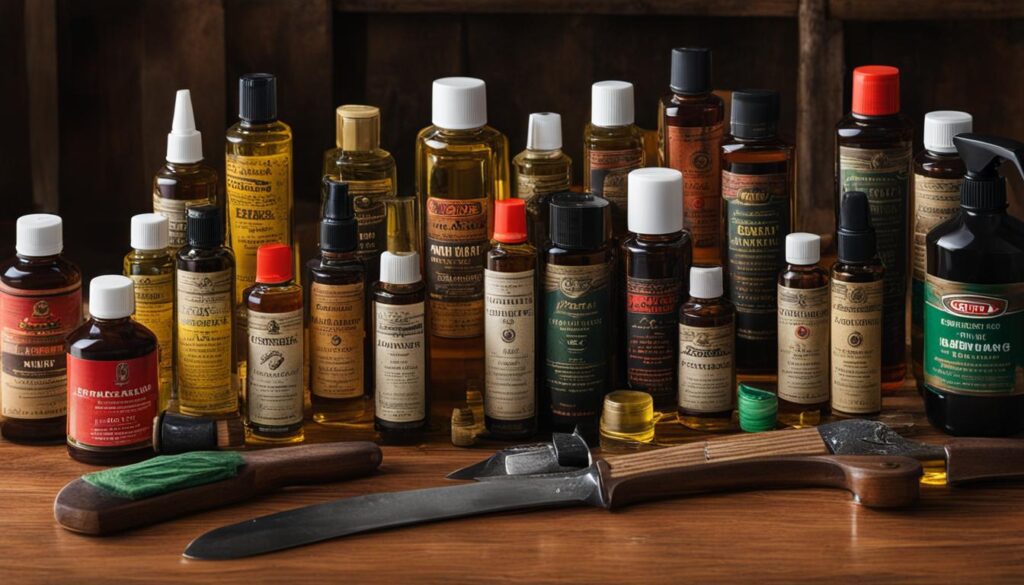

Conclusion
In conclusion, proper maintenance and care are crucial for maintaining folding knives in their best condition. Regular cleaning, lubrication, and sharpening help prevent rust, corrosion, and dirt buildup, ensuring optimal performance and longevity.
It is important to understand that different types of knives require specific maintenance and care. By following the recommended guidelines and understanding the needs of each knife, you can ensure that your folding knives perform at their best every time.
Additionally, taking care of other outdoor gear such as sleeping bags, tents, boots, and firearms is essential for a successful and safe outdoor experience. Regular maintenance, storage, and cleaning of these items help maintain their function and ensure a positive outdoor adventure.
Remember to carry a field repair kit and keep your medical kit up-to-date for any emergencies that may arise. By implementing these maintenance tips and guidelines, you can enjoy the optimal performance and longevity of your folding knives and other outdoor gear.
FAQ
Why is proper maintenance and cleaning of folding knives important?
Proper maintenance and cleaning of folding knives are important to ensure their optimal performance and prevent rust, corrosion, and dirt buildup.
What does maintaining folding knives involve?
Maintaining folding knives involves sharpening, disassembly, cleaning, lubrication, and reassembly.
What gear do I need for proper maintenance of folding knives?
For proper maintenance of folding knives, you will need pivot lube, corrosion inhibitor, Torx set, blue Loctite, isopropyl alcohol, microfiber cloth, paper towels, compressed air, cotton swabs, and a knife sharpening system.
How do I disassemble a folding knife?
Disassembly of a folding knife involves removing the screws and organizing them to avoid any complications during reassembly.
How do I clean a folding knife?
Cleaning a folding knife requires the use of isopropyl alcohol, cotton swabs, paper towels, and compressed air. It is important to remove any discoloration, patina, or rust before moving on.
What lubricant should I use for folding knife maintenance?
Lubrication should be done with viscous products that are not too runny or too thick. Recommended lubricants include Benchmade Blue Lube, Tuf-Glide, or KPL.
How do I reassemble a folding knife?
Reassembly should be done carefully, following tutorials if needed, and using blue Loctite to ensure the blade stays centered and the action is consistent.
How do I sharpen a folding knife?
Sharpening or reprofiling a folding knife can be done using different sharpening systems and grits. The angle of the edge depends on the type of knife and its intended use.
How can proper maintenance prolong the lifespan of folding knives?
Proper maintenance of folding knives will prolong their lifespan and keep them performing at their best.
What are the five rules for proper knife maintenance?
The five rules for proper knife maintenance include keeping the knife sharp, clean, dry, well-oiled, and in good working order.
How do I care for hunting knives?
Hunting knives should be cleaned thoroughly after each use to remove blood, dirt, and debris.
How should I care for pocket knives used for everyday carry?
Pocket knives used for everyday carry should be checked for proper lubrication and functioning regularly.
How should I care for kitchen knives?
Kitchen knives should be cleaned and dried after each use to prevent rust and damage.
What additional maintenance do outdoor and survival knives require?
Outdoor and survival knives may require additional maintenance, such as sharpening, reprofiling, and special treatments for the handle and blade.
How should I store my knives?
Proper storage of knives, whether in sheaths, cases, or on racks, is important to prevent damage and ensure their longevity.
How should I store other outdoor gear?
Letting your gear dry between uses is crucial to prevent mold and degradation. Proper storage of sleeping bags, boots, and other gear helps maintain their function and longevity.
How can I maintain the waterproof capabilities of my outdoor gear?
Regular cleaning and waterproofing of tents, backpacks, and other gear is recommended to ensure their waterproof capabilities.
What should I include in my field repair kit?
Carrying a field repair kit with basic tools and supplies is essential for quick fixes in the field.
How important is it to keep my medical kit updated?
Keeping your medical kit updated and well-stocked is important for emergency situations.
How should I care for firearms, bows, and arrows?
Regular cleaning, storage, and maintenance of guns, shotguns, bows, and arrows are necessary to prevent damage and ensure accurate shooting.
How can I ensure that my folding knives and other gear perform at their best?
By following these maintenance tips and guidelines, you can ensure that your folding knives and other gear perform at their best every time.
Do you have any additional tips for knife maintenance?
Regularly touching up the edge, keeping the knife clean, dry, and well-oiled, and inspecting and maintaining other parts of the knife are additional tips for proper knife maintenance.
